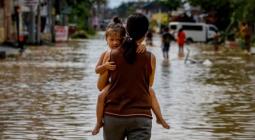Supreme Court Declines to Hear Youth-Led Climate Case. The Youth Say They Will Fight On
Juliana v. United States sought to hold the federal government accountable for its fossil fuel policies, saying they infringed on their right to life, liberty and property.
The U.S. Supreme Court this week declined to take up a closely watched lawsuit brought by 21 young people challenging the federal government’s fossil fuel energy system.
The high court’s decision Monday in Juliana v. United States ends a 10-year legal effort to hold the government accountable for knowingly endorsing an energy system that would destabilize the climate. The complaint claimed the situation infringed on the young plaintiffs’ rights to life, liberty and property and called on the government to phase out carbon emissions and implement national plans to address the energy and environmental problems they created.
Despite the decision, the lawsuit’s impact continues to reverberate.
“Juliana has inspired and motivated countless youth-brought climate change cases around the world. It’s really reframed the issue from one of a pollution problem to one of a human rights problem,” said Andrea Rodgers, senior litigation attorney at Our Children’s Trust, the Oregon-based advocacy group that brought the lawsuit on behalf of the plaintiffs.
“Young people have been at the forefront of the civil rights movement throughout history. We’ve seen that with desegregation of schools and a variety of other concerns, and I think this is yet another example,” she said. “Young people are standing up and seeking justice and displaying incredible leadership. We must remember there are a lot of young people under the age of 18 that don’t have the vote or don’t have the money to lobby legislators, so it’s very important that they have the ability to access the court.”
Our Children’s Trust said the legal framework established by Juliana has inspired more than 60 youth-led lawsuits worldwide. In 2023 the organization celebrated a groundbreaking victory in Montana, the first time a court in the U.S. declared that a government had a constitutional responsibility to protect people from the effects of climate change. The next year the group reached a settlement in Hawaii that included a plan to decarbonize the state’s transportation system.
The Supreme Court offered no reason for declining Juliana. Rodgers said the organization was considering options. The Justice Department did not respond to a request for comment.
The lawsuit claimed the federal government knew since 1965 that burning fossil fuels would lead to dangerous climate change.
“Defendants have acted with deliberate indifference to the peril they knowingly created,” the complaint reads. “As a result, Defendants have infringed on Plaintiffs’ fundamental constitutional rights to life, liberty, and property. Defendants’ acts also discriminate against these young citizens, who will disproportionately experience the destabilized climate system in our country.”
Miko Vergun said she got involved as a plaintiff after attending environmental advocacy meetings with her mother and brother, where the activists would talk of saving the planet for the next generation—but it was mostly adults who were present.
A recent graduate of Oregon State University, Vergun was concerned about wildfires that sometimes prevent her from going outside and also affect her brother, who suffers from asthma. She was born in the Marshall Islands, which is threatened by sea level rise and intensifying storms.
“It is definitely a horrible ruling in my opinion because we’ve been ready to go to court. We have the resources. We have the evidence. And unfortunately we didn’t get the ruling to go to court. But so many good things have come about because of this lawsuit, despite it not going to court. And despite my feeling sad about that I’m also feeling very hopeful for a new beginning,” said Vergun, 23, who studied cultural anthropology and communications at Oregon State.
“Hopeful for the next generation of youth to speak out.”
Cover photo: The young plaintiffs in Juliana v. United States demonstrate outside the White House in Washington, D.C. Credit: Robin Loznak/Our Children’s Trust




